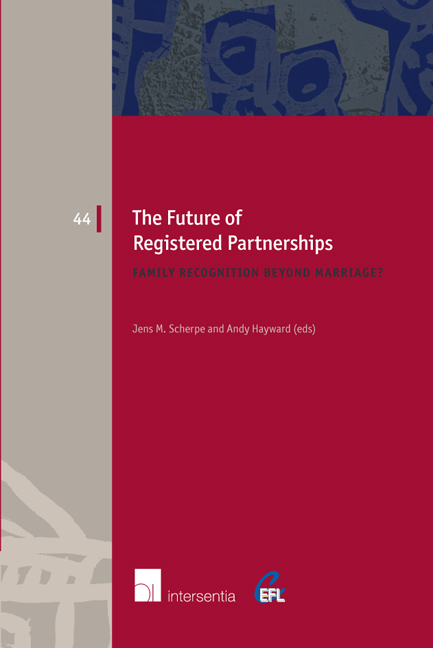Book contents
- Frontmatter
- Foreword
- Preface
- Contents
- List of Contributors
- The Future of Registered Partnerships: An Introduction
- Questionnaire
- Part I Registered Partnerships as a Functional Equivalent to Marriage
- Part II Registered Partnerships as an Alternative to Marriage
- Part III Registered Partnerships in a Time of Transition
- Part IV Alternative Models for Registered Partnerships: Beyond Conjugality, Beyond Formality
- Registered Partnerships in Spain
- Registered Partnerships in Belgium
- Registered Partnerships in Australia
- Registered Partnerships in New Zealand
- Part V Registered Partnerships, Discrimination and Human Rights
- Part VI Comparative Perspective and Conclusions
- Index
- European Family Law Series
Registered Partnerships in Spain
from Part IV - Alternative Models for Registered Partnerships: Beyond Conjugality, Beyond Formality
Published online by Cambridge University Press: 22 September 2018
- Frontmatter
- Foreword
- Preface
- Contents
- List of Contributors
- The Future of Registered Partnerships: An Introduction
- Questionnaire
- Part I Registered Partnerships as a Functional Equivalent to Marriage
- Part II Registered Partnerships as an Alternative to Marriage
- Part III Registered Partnerships in a Time of Transition
- Part IV Alternative Models for Registered Partnerships: Beyond Conjugality, Beyond Formality
- Registered Partnerships in Spain
- Registered Partnerships in Belgium
- Registered Partnerships in Australia
- Registered Partnerships in New Zealand
- Part V Registered Partnerships, Discrimination and Human Rights
- Part VI Comparative Perspective and Conclusions
- Index
- European Family Law Series
Summary
HISTORY AND BACKGROUND
THE LAW GOVERNING FAMILY RELATIONSHIPS IN SPAIN
In Spanish law it is essential to distinguish between two levels of legislation: Spanish general law (derecho comun) on the one hand, and regional or territorial laws (derechos auton o micos, also called derechos forales in some regions) enacted by the autonomous communities, on the other. Historically, Spain never succeeded in unifying its private law. Some territories retained their traditional legal systems over the centuries, and the Spanish Constitution of 1978 (hereafter, CE) recognised and preserved this diversity. Article 148.1 No. 8 CE granted these territories, which were established as autonomous communities in 1978, the power to preserve, amend and develop their own civil law.
Under this provision the Spanish state reserves legislative competence in certain matters, including ‘civil relationships relating to the forms of marriage’. This rather obscure concept is understood to include the regulation of forms of marriage, the requirements for its celebration and the grounds for its dissolution. In contrast, the regulation of the effects of marriage and marriage breakdown is not considered to fall necessarily within the scope of Spanish general law, and some communities – particularly Catalonia, in Book 2 of the Catalan Civil Code (hereafter, CCCat)– have legislated intensively in these areas.
It is important to highlight the fact that not all communities have lawmaking powers in civil matters. These powers are restricted to those territories that already had their own laws before 1978: Catalonia, Aragon, Navarre, the Basque Country, Galicia and the Balearic Islands. The remaining communities are governed by Spanish general law (so-called derecho comun), which also operates as the default law in the seven communities mentioned in absence of regulations of their own (Article 149.3 CE).
The law governing adult relationships within a family context in Spain includes the regulation of marriage and domestic partnerships between unmarried couples.
Marriage
Competence in marriage law lies partly with the state and partly with the communities empowered to legislate in civil matters. Spanish general law lays down the requirements for access to marriage, the forms for its celebration and the regime for its dissolution (Articles 44 – 89 Spanish Civil Code, hereafter CC). As mentioned above, some communities have regulated the effects of marriage and the consequences of its breakdown, both at a personal and especially a financial level, to varying degrees of intensity and thoroughness.
- Type
- Chapter
- Information
- The Future of Registered PartnershipsFamily Recognition Beyond Marriage?, pp. 349 - 380Publisher: IntersentiaPrint publication year: 2017

